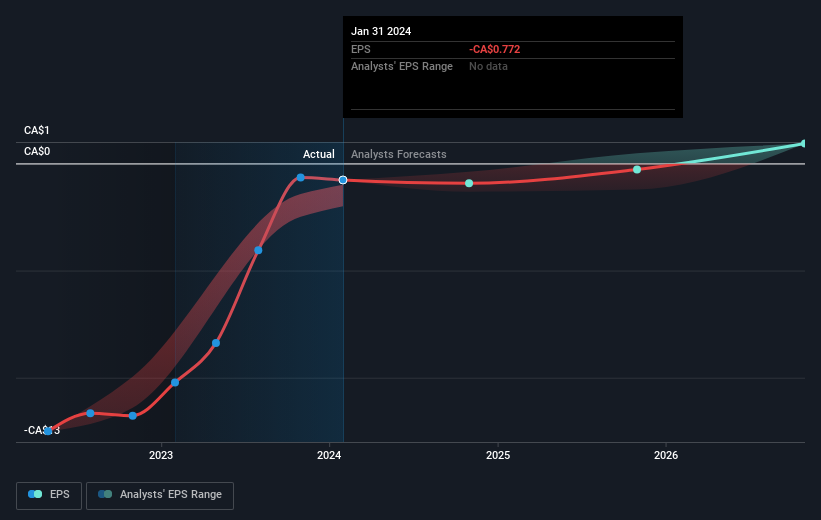When Will Transat A.T. Inc. (TSE:TRZ) Turn A Profit?
We feel now is a pretty good time to analyse Transat A.T. Inc.'s (TSE:TRZ) business as it appears the company may be on the cusp of a considerable accomplishment. Transat A.T. Inc., together with its subsidiaries, engages in the leisure travel business primarily in Europe and the Caribbean. The CA$130m market-cap company posted a loss in its most recent financial year of CA$25m and a latest trailing-twelve-month loss of CA$30m leading to an even wider gap between loss and breakeven. The most pressing concern for investors is Transat A.T's path to profitability – when will it breakeven? In this article, we will touch on the expectations for the company's growth and when analysts expect it to become profitable.
See our latest analysis for Transat A.T
Transat A.T is bordering on breakeven, according to the 5 Canadian Airlines analysts. They expect the company to post a final loss in 2025, before turning a profit of CA$36m in 2026. Therefore, the company is expected to breakeven roughly 2 years from now. How fast will the company have to grow each year in order to reach the breakeven point by 2026? Working backwards from analyst estimates, it turns out that they expect the company to grow 63% year-on-year, on average, which is extremely buoyant. Should the business grow at a slower rate, it will become profitable at a later date than expected.
Given this is a high-level overview, we won’t go into details of Transat A.T's upcoming projects, though, bear in mind that by and large a high forecast growth rate is not unusual for a company that is currently undergoing an investment period.
One thing we would like to bring into light with Transat A.T is it currently has negative equity on its balance sheet. This can sometimes arise from accounting methods used to deal with accumulated losses from prior years, which are viewed as liabilities carried forward until it cancels out in the future. These losses tend to occur only on paper, however, in other cases it can be forewarning.
Next Steps:
There are too many aspects of Transat A.T to cover in one brief article, but the key fundamentals for the company can all be found in one place – Transat A.T's company page on Simply Wall St. We've also put together a list of essential factors you should further examine:
Valuation: What is Transat A.T worth today? Has the future growth potential already been factored into the price? The intrinsic value infographic in our free research report helps visualize whether Transat A.T is currently mispriced by the market.
Management Team: An experienced management team on the helm increases our confidence in the business – take a look at who sits on Transat A.T’s board and the CEO’s background.
Other High-Performing Stocks: Are there other stocks that provide better prospects with proven track records? Explore our free list of these great stocks here.
Have feedback on this article? Concerned about the content? Get in touch with us directly. Alternatively, email editorial-team (at) simplywallst.com.
This article by Simply Wall St is general in nature. We provide commentary based on historical data and analyst forecasts only using an unbiased methodology and our articles are not intended to be financial advice. It does not constitute a recommendation to buy or sell any stock, and does not take account of your objectives, or your financial situation. We aim to bring you long-term focused analysis driven by fundamental data. Note that our analysis may not factor in the latest price-sensitive company announcements or qualitative material. Simply Wall St has no position in any stocks mentioned.

 Yahoo Finance
Yahoo Finance 
